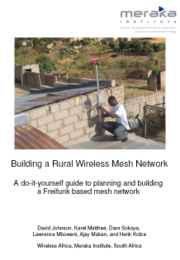DIY Mesh Guide: Difference between revisions
No edit summary |
No edit summary |
||
| Line 13: | Line 13: | ||
== About The Guide == | == About The Guide == | ||
==== Building a Rural Wireless Mesh Network ==== | ==== Building a Rural Wireless Mesh Network ==== | ||
(Comment: need content about the guide) | |||
Version '''0.8''' covers the following topics: | Version '''0.8''' covers the following topics: | ||
Revision as of 16:52, 1 November 2007

Building a Rural Wireless Mesh Network: A do-it-yourself guide to planning and building a Freifunk based mesh network
Background
(Comment - rationale for developing the guide, history, etc.)
About The Guide
Building a Rural Wireless Mesh Network
(Comment: need content about the guide)
Version 0.8 covers the following topics:
- Chapter 1: Introduction
- Chapter 2: Description of a wireless mesh network
- Chapter 3: Important condsiderations
- Chapter 4: Required Hardware and software
- Chapter 5: Planning the wireless mesh network
- Chapter 6: Building the wireless mesh network
- Chapter 7: Services on the network
- Appendix A: Acronyms
Core Group
(Comment - need to put a two liner description of the team members)
David Johnson - aka "kingdavid" is a research leader in the Wireless Africa group at the Meraka Institute.
Karel Mathee -
Dare Sokoya -
Lawrence Mboweni -
Ajay Makan -
Henk Kotze -
Download
You can download the latest version of the guide in .PDF format here
Resources from the guide
- Video - Making a Cantenna The video shows, step-by-step, the building of a cantenna (antenna made from a can) for wireless networking (Wi-Fi, WLAN at 2.4 Ghz). Without audio, and with simple subtitles and clear pantomimic instructions, the video lends itself well to localisation.
- Wireless Networking in the Developing World The overall goal of this book is to help you build affordable communication technology in your local community by making best use of whatever resources are available. Using inexpensive off-the-shelf equipment and local sources for materials and fabricating parts yourself, you can build reliable network links with very little budget. By working with your local community, you can build a telecommunications infrastructure that benefits everyone who participates in it.
Feedback
Please send us your feedback, comments and corrections to wa-admin[at]meraka.org.za. We would like to know how you have used the guide, whether the guide was useful in setting up your mesh network and what topics should be expanded on or covered in the guide.